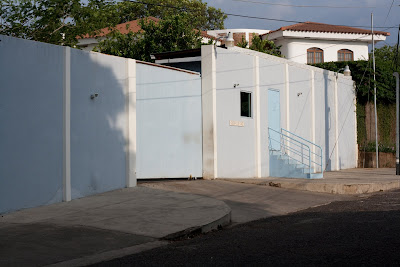Today is my last day of classes at my school, INJOCRUM (Instituto Nacional José de la Cruz Mena). I’m actually pretty sad to be leaving the kids… though at the beginning of my service I sort of dreaded going to school, by the end I finally found my groove as a teacher and going to school became the only thing that I really enjoyed about being here.
Here’s where I walked daily to get from the market where I got off the bus to my school. This is also where
Marvin and company always harassed me:
This is the outside area of my school; this is before first hour when kids are just hanging out, playing soccer, and buying snacks:
Here’s the marching band at a competition my first year at INJOCRUM. I never liked all the class we missed for the band to practice, but I did like their cheese grater instruments.
I spent many, many hours in the teachers lounge since my teaching schedules always had a lot of free hours in them. The barred doors in the first picture go to the principal’s office, the secretary’s office, and the vice principal’s office. The painting in the second picture is of José de la Cruz Mena, the musician for whom the school is named.
These are some of the students I had my very first school year here, in first year (7th grade) in the morning with Francis. The one in the middle is Eddyson, and he was one of my favorites:
This is my IV E (fourth year, section “E”) class from last year. This class first made me enjoy coming to school, and I was legitimately sad when I no longer got to teach them. They were all good kids that participated in class, did their homework, and laughed and my corny attempts to make jokes.
Here’s III G (third year, section “G”) from this year. In the first picture they’re learning directions. I had many of these same students last year in second year as well.
This is Rafael, one of my favorite kids that I had both last year and this year. He loves to ask me how to say new phrases and then practices them on me later (like, “Teacher, welcome to our class!” “I am finished!” and “See you tomorrow, teacher!”). Here he is showing off the chicken skeleton he made for science class. They asphyxiated the chicken so as not to break any of its bones, and then he carefully disassembled it and glued it back together. I think it’s really gross, but also pretty interesting.
Here’s Rafael’s class, III I, learning prepositions of place.
Finally, I’ll also miss the teachers. This picture is from a staff meeting where we also had a dance competition to practice our solidarity. This is Lila, who is an amazing seamstress and sews most of her own clothes (and also brings clothes and purses to school to sell to other teachers). At the far left is Iris who took a long time to warm up to me, but eventually she learned my name (“Holly Regan, but not like Ronald Reagan, that’s it, right?”) and we became friends.
When the last bell rings at 5:45, the kids come pouring out of the gate to the school. I rarely get out of school quickly enough to see the whole mess of students leaving to go home; these are a few stragglers that took more than 30 seconds to get out of school.
I never thought I’d say it, but I’ll actually miss being a teacher here.
Read more...



































